ARTICLE AD BOX
Yolande Knell
Middle East correspondent
Reporting fromJerusalem
Jacob Evans
BBC News
Reporting fromJerusalem

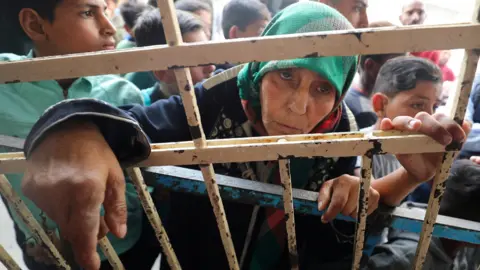 Reuters
Reuters
A woman stands outside one of the WFP-supported bakeries that were forced to close on Tuesday due to a lack of flour and fuel
One month since Israel closed all crossings to Gaza for goods, all UN-supported bakeries have closed, markets are empty of most fresh vegetables and hospitals are rationing painkillers and antibiotics.
It is the longest blockade yet of Israel's nearly 18-month-long war against Hamas. This week, during the normally festive Muslim holiday of Eid al-Fitr, many Gazans say they have gone hungry.
"This was the worst ever Eid for us," Um Ali Hamad, a displaced woman from Beit Lahia, told the BBC as she searched for food in Gaza City. "We can't eat or drink. We couldn't enjoy it. We're exhausted."
"We can no longer find things to eat like tomatoes, sugar or oil. They're not available. I can barely find one meal a day. Now, there are no charity food handouts."
"I only have one grandchild; he was born during the war. He's three months old and we can't find milk or nappies for him."
Israel said it was imposing a ban on goods entering Gaza on 2 March due to Hamas's refusal to extend the first phase of the January ceasefire deal and release more hostages.
Hamas has continued to demand a move to the second phase of the original agreement, which would see the remaining living hostages it holds being released and a full end to the war.
A two-month long truce, which started on 19 January, saw the return of 33 Israeli hostages - eight of them dead - in exchange for about 1,900 Palestinian prisoners and a big surge in humanitarian aid entering the devastated territory.
Aid agencies are now calling for world powers to force Israel to allow essential goods into Gaza - including food, medicines, hygiene products and fuel - pointing to the country's obligations under international humanitarian law.
They say they are making tough decisions about how to manage their dwindling stocks in the territory. Fuel, for example, is needed for vehicles to move aid, bakeries, hospital generators, wells and water desalination plants.
The NGO ActionAid called the month-long Israeli ban on aid entering Gaza "appalling" and warned a "new cycle of starvation and thirst" loomed.
On Tuesday, the UN dismissed as "ridiculous", an Israeli assertion that there was enough food in Gaza to last its roughly two million residents for a long time.
"We are at the tail end of our supplies," UN spokesperson Stephane Dujarric said.

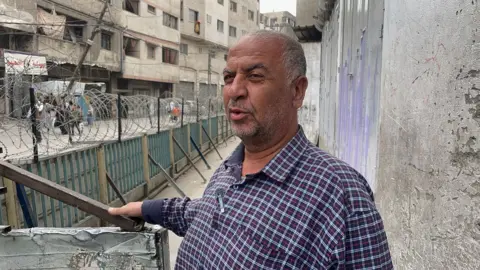
Abu Alaa Jaffar in Gaza City says the closure of bakeries is a "catastrophe"
Cogat, the Israeli military body that controls crossings, says that during the recent ceasefire some 25,200 lorries entered Gaza carrying nearly 450,000 tonnes of aid.
"That's nearly a third of the total trucks that entered Gaza during the entire war, in just over a month," Cogat wrote in a post on X. "There is enough food for a long period of time, if Hamas lets the civilians have it."
Israeli officials accuse Hamas of hoarding supplies for itself. However, Dujarric said the UN had kept "a very good chain of custody on all the aid it's delivered".
Shutters are down, ovens off and the shelves empty at a bakery in Gaza City - one of 25 that worked with the UN's World Food Programme (WFP) across the strip. With shortages of fuel and flour, a sign says it is closed "until further notice".
"Closing the bakery is a catastrophe because bread is the most important staple for us," said a grandfather, Abu Alaa Jaffar, looking on despairingly.
"Without it, people don't know how to deal with the situation. There will be starvation much worse than we saw before."
He and other passersby told the BBC that a 25kg (55lb) bag of flour had gone up as much as 10-fold and could now fetch 500 shekels ($135; £104) on the black market.

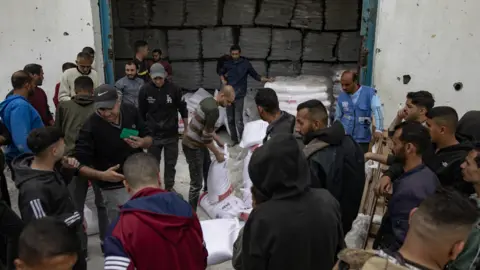 EPA
EPA
The UN says it is "at tail end of our supplies" that came through Gaza's crossings
For months, Israel has prevented commercial goods from entering Gaza - saying that this trade benefited Hamas - and local food production has stopped almost completely because of the war.
While many food kitchens supported by international NGOs have recently stopped working as their supplies have run out, the WFP expects to continue distributing hot meals for a maximum of two weeks.
It says it will hand out its last food parcels within two days. As a "last resort" once all other food is exhausted, it has emergency stocks of fortified nutritional biscuits for 415,000 people.
Meanwhile, the UN agency for Palestinian refugees (UNRWA), the biggest aid agency operating in Gaza, says it has only a few days' worth of food left to give out.
"We're seeing a very quick depletion of what we have in our warehouses," said communications director Tamara al-Rifai. "Everyone is rationing everything because it's not clear whether and when there is an end in sight."
"What's extremely striking to us is how fast the positive impact of the ceasefire - if I can use the word 'positive', namely being able to bring food and other supplies - is how fast that impact has evaporated in four weeks."

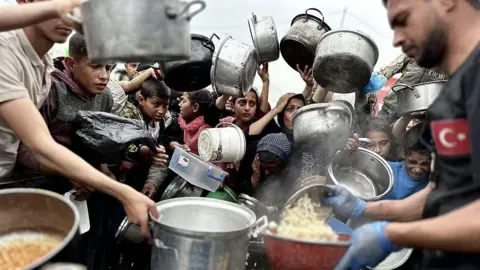 Getty Images
Getty Images
Israeli military body Cogat insists there is "enough food for a long period of time" and accuses Hamas of hoarding supplies
Israel resumed the war in Gaza on 18 March. Its renewed air and ground operations have once again made it difficult for aid workers to move around and have led to hundreds of casualties, overwhelming hospitals.
The UN's World Health Organisation (WHO) says over half of the hospitals receiving trauma cases are now virtually full.
Devices to stabilise broken bones have run out, while anaesthesia, antibiotics and fluids for wounded patients are dwindling. The WHO warns that vital supplies for pregnant mothers will run out imminently.
Dr Mark Perlmutter, an American surgeon who was recently working in Gaza, told the BBC that he was forced to use drill bits to fix a fracture in a child's leg and that there was no working X-ray machine in the two hospitals where he was based.
He added that he was unable to clean wounds before operating or even wash his hands as soap had run out.
Another mass casualty event would mean "people are going to die from wounds that could have been corrected", Dr Perlmutter said.
So far, at least 1,066 Palestinians have been killed - about one third of whom are children - since Israel began its renewed military offensive in Gaza, according to the Hamas-run health ministry.
The WHO also warns of serious public health concerns after the facilities for diagnosing infectious diseases were forced to close.
The international health charity Médecins Sans Frontières (MSF) is calling on Israel to halt what it calls the "collective punishment of Palestinians".
It says some patients are being treated without pain relief and that those with conditions requiring regular medication, such as epilepsy or diabetes are having to ration their supplies.

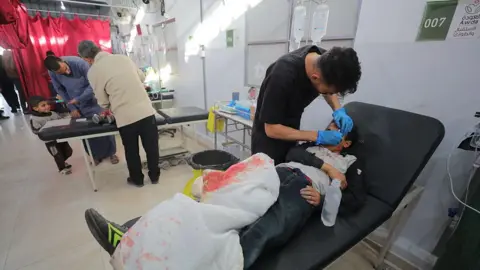 Getty Images
Getty Images
The WHO says over half of the hospitals in Gaza receiving trauma cases are now virtually full
Last year, the International Court of Justice ordered Israel to "take immediate and effective measures to enable the provision of urgently needed basic services and humanitarian assistance to address the adverse conditions of life faced by Palestinians in the Gaza Strip".
South Africa has brought an ongoing case before the UN's top court, alleging that Israel is committing genocide against Palestinians in Gaza. Israel rejects the claim as "baseless."
The war in Gaza was triggered by the deadly Hamas-led attacks on southern Israel on 7 October 2023, which killed some 1,200 people and led to 251 hostages being taken to Gaza. Since then, more than 50,000 Palestinians have been killed, Palestinian health authorities say.
Arab mediators are continuing to try to resurrect the ceasefire.
Hamas said on Saturday that it had accepted a new proposal from Egypt. Israel said it had made a counterproposal in coordination with the US, which has also been mediating.
There have been no signs of an imminent breakthrough or an end to the Israel closure of crossings into Gaza.

 2 months ago
32
2 months ago
32








 English (US) ·
English (US) ·